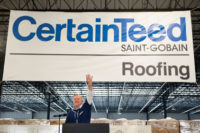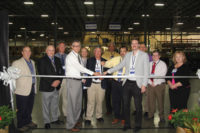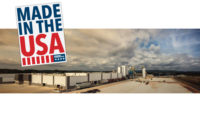Made in the USA: GAF's Investment in New Plants Demonstrates the Company's Commitment to the Industry


GAF opened two state-of-the-art ISO manufacturing facilities in 2013. The plants are in Statesboro, Ga., and Gainesville, Texas. Photos courtesy of GAF.

Speakers at the press conference included (seated, from left) Bob Tafaro, Moberly Mayor John Kimmons and Missouri Governor Jay Nixon (at podium).

At a March 18 press conference in Moberly, Mo., GAF President and CEO Bob Tafaro announced the area would be the site for the company’s newest asphalt roofing shingle manufacturing facility.

Pictured are (from left) Gov. Nixon, Moberly Mayor Pro Tem Bill Schaffer, Tafaro and Kimmons. Photos by Lucas Photography.





As the economy continues to rebound from the recent recession, the strength of the recovery has been an endless source of debate. It might be anecdotal evidence for economists, but the number of recent announcements from roofing materials manufacturers about investments in new plants and major upgrades to existing facilities can only be seen as a positive sign for the U.S. economy and the health of the roofing industry in particular.
Economic trends and consumer demand are tough enough to forecast in any sector of the economy. In the roofing industry, unpredictability is an even bigger part of the equation. Storm activity can make it almost impossible to forecast the demand for roofing products. At a moment’s notice, manufacturers, distributors and contractors can be called on to deliver and install large quantities of products in a big hurry.
Despite a soft economy, several major manufacturers of roofing materials have made major investments in their infrastructure. These developments were the inspiration for a new series of articles titled “Made in the USA.” This ongoing feature will showcase companies that are committed to American manufacturing, and the development of new technology and improved roofing products. It will also detail how companies are working to elevate the entire industry — and help contractors and their clients in the process.
In this, the first installment of the series, Roofing Contractor puts the spotlight on GAF, which has celebrated several new plant openings and recently announced plans to open a brand-new, state-of-the-art shingle manufacturing facility in Moberly, Mo.
According to Bob Tafaro, president and chief executive officer of GAF, the company has invested approximately $350 million in its facilities to ensure it can meet the long-term and short-term needs of its customers as well as deliver increased innovation. The goal, according to Tafaro, is to increase capacity, enabling the company to deliver more products and at the same time be nimble enough to adapt to changing conditions. “We already have one of the most technologically advanced manufacturing networks but are committed to investing further to continue to produce the highest quality products,” he said. “It’s true that we’ve been busy growing our business, and the fact that we’re doing it despite the economic downturn says a lot about our team’s ability to perform against the odds.”
Tafaro outlined some of the recent investments for Roofing Contractor, including the $150 million investment in the Moberly plant, which he noted will have the largest capacity of any facility in the industry when it is up and running in late 2017. The facility will represent the company’s 14th shingle plant and its eighth four-wide laminator. It will be designed to leverage the company’s Advanced Protection Shingle Technology, which utilizes a proprietary shingle mat, optimized weathering layer of the shingle and a proprietary Dura Grip™ adhesive. According to the company, GAF performs more than 185 individual tests in the making of Advanced Protection Shingles. “The Moberly plant will have more than 340,000 square feet of manufacturing and office space, and it will be equipped with the most modern technology,” Tafaro said.
The area’s proximity to rail lines and interstate highways was a key factor in the selection of the site. “When we make decisions to grow our business through capital investments such as a new plant, several factors are considered — one of the most important being physical location,” Tafaro said. “The Midwest is a growing market for us, and we can better meet customer expectations by having a manufacturing presence there. Moreover, this decision means that other GAF plants that are serving Midwest customers will be able to redirect their capacity to serve customers within their own regions.”
The announcement of the new shingle plant followed closely on the heels of the opening of two new ISO plants. “Our Statesboro, Georgia, ISO plant came online in early 2013, followed by our Gainesville, Texas, ISO plant in late 2013,” he said. “In each case, we opened on time or ahead of schedule and on budget, and each plant immediately started contributing to our ability to meet customer demand with quality products.”
Both plants have the capability to manufacture flat and tapered board, HD cover boards, sheathing, and vented nail board. According to Tafaro, the highly automated lines allow for high-speed operation and consistent quality — and result in very little scrap.
The company is also scheduled to begin manufacturing Everguard TPO and Everguard Extreme TPO in its Cedar City, Utah, plant later this year. The new location will also soon have the capability to manufacture flat and tapered ISO board, HD cover boards and sheathing.
While the new plants made the biggest news, they weren’t the only major investments GAF made to help its manufacturing capability. As just two examples, GAF added a high-end laminator in Mount Vernon, Ind., to further enhance the speed and quality of shingle production there. And in Baltimore, machine capability was upgraded by 25 percent while at the same time converting measurements from English to metric sizes. Numerous other investments have been made to enhance shingle, membrane and roofing accessory capacity across GAF’s plant network.
Committed to Helping Roofing Contractors
These decisions are made with contractors in mind, noted Tafaro. “Everything we do is designed to support our contractors in our joint mission to provide quality and innovative products to customers,” he said. “Increased capacity means product is more likely to be in stock and available when a contractor needs it and a job depends on it. Just as important is the added confidence that our contractors have knowing that the GAF products they’re providing are the best, most innovative that the industry has to offer.”
Code requirements are always an important consideration. In an era where codes have been changing rapidly, GAF is gearing up to meet and exceed them. “2014 is a key year for code requirements,” Tafaro said. “The most significant residential code change has been the emergence of ICC’s AC 438 acceptance criteria for shingles. AC 438 is a new standard in codes that is performance based rather than being prescriptive on the ingredients of a shingle. It’s also the first standard for asphalt shingles that tests the performance of the shingle after accelerated aging as opposed to at the time of manufacture, which puts a greater focus on longer-term, ‘real-world’ performance of products. At GAF, we believe our new manufacturing capabilities put us in a strong position to meet not only the code requirements of today but those of the future. It lets us take advantage of advancements in material science and opens the door for many new product innovations. Of course, I believe there’s no other roofing company better positioned to bring these innovations to market than GAF.”
Handling multiple long-term projects at once is a daunting task, but Tafaro noted that GAF has other expansion plans for the future. “In addition to the Moberly plant opening in 2017, we expect our Cedar City, Utah, plant will start manufacturing both TPO and ISO products later this year,” he said. “We also expect to announce further investments in manufacturing with the construction of our first polyvinylchloride (PVC) single-ply roofing membrane production line. Currently, we’re searching in the Northeast for a site for our fourth ISO manufacturing facility. Yet beyond our physical expansion, contractors can continue to expect from us the quality and innovation they know and trust. Every year, we’re adding value not only by offering the most innovative and dependable products in the market, but also by training contractors and backing up our claims with guarantees. We may be getting bigger every year, but we’re also getting better.”
Looking for a reprint of this article?
From high-res PDFs to custom plaques, order your copy today!










